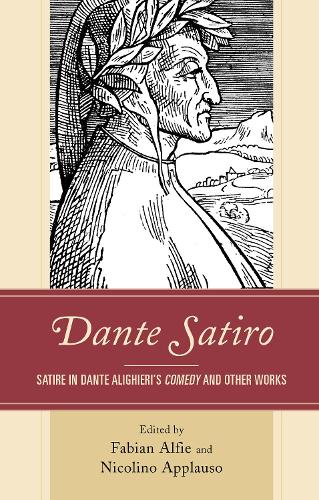
Dante Satiro: Satire in Dante Alighieri's Comedy and Other Works
(Hardback)
Available Formats
Publishing Details
Dante Satiro: Satire in Dante Alighieri's Comedy and Other Works
By (Author) Fabian Alfie
Edited by Nicolino Applauso
Bloomsbury Publishing PLC
Lexington Books
19th May 2020
United States
Classifications
Tertiary Education
Non Fiction
Literary studies: poetry and poets
851.1
Physical Properties
Hardback
230
Width 161mm, Height 228mm, Spine 21mm
549g
Description
As Virgil leads Dante through Limbo, the uppermost portion of Hell, they are joined by four classical poets, and Virgil describes one of them as Horace the satirist (Orazio satiro, 4:89). This collection of essays applies the expression to Dante himself in order to emphasize the satirical elements of his works. Although Dante is not typically described as a satirist, anyone familiar with his works will recognize the strong satirical element in his many writings. By exploring the satiric elements in Dantes literature, these essays explore the primary literary tool at his disposal for his prophetic objectives: the castigation of vice. This collection of essay is the first comprehensive study on Dante and satire within his entire corpus that has ever been published.
Reviews
We all know a lot about Dante "comico" and his style. But on the other hand no one has ever tried to read his works as belonging to satirical genre, as if he used the poetic code as a way to struggle with the vices of his time. This is what Dante Satiro: Satire in Dante Alighieri's Comedy and Other Works is made up of for the first time, not only relating to his masterpiece (the Commedia), but also looking for a satirical tone where it's not expected, like in the linguistic treaty De vulgari eloquentia, or pointing out his influence on contemporary satire.--Marco Berisso, University of Genova
The essays in this volume examine satire in Dante's Divine Comedy, lyric poetry, and prose works. Alfie (Univ. of Arizona) and Applauso (Loyola Univ. Maryland) understand satire as "the genre dedicated to the reprehension of vice" (p. 3). The editors' introduction will be much appreciated since it both positions the volume within Dante criticism and provides a brief accessible overview of medieval European understandings of satire. The volume is divided into two parts: the first (four essays) focuses on the Comedy, and the second (also four essays) looks at satire in the minor works. Highlights among the essays include a reassessment of Paradiso 27 by Maggie Fritz-Morkin (Univ. of North Carolina at Chapel Hill) and a novel analysis of satire in the De vulgari eloquentia by Anthony Nussmeier (Univ. of Dallas). The volume finishes with a lighthearted essay by Arielle Saiber (Bowdoin College) exploring how Dante has become an enduring reference in modern popular culture and humor. Summing Up: Recommended. Upper-division undergraduates through faculty.
-- "Choice Reviews"Author Bio
Fabian Alfie is professor of Italian at the University of Arizona.
Nicolino Applauso is visiting assistant professor of Italian at Loyola University Maryland.
